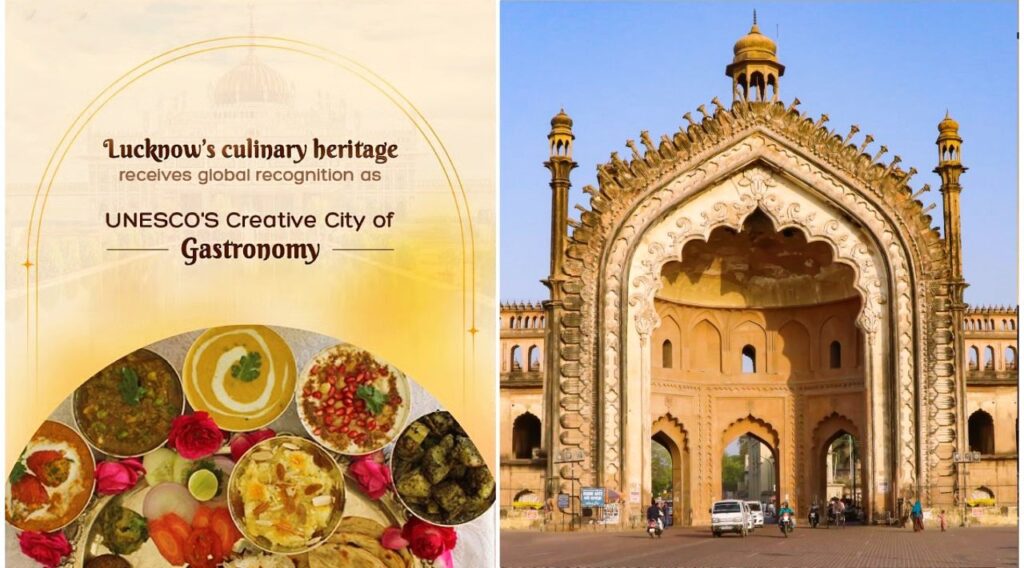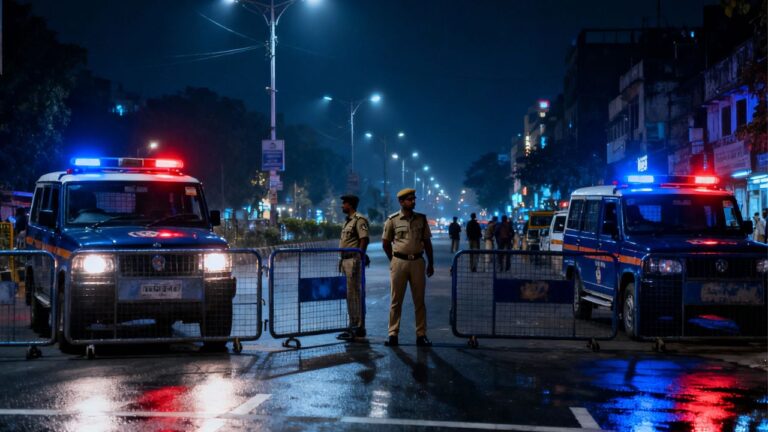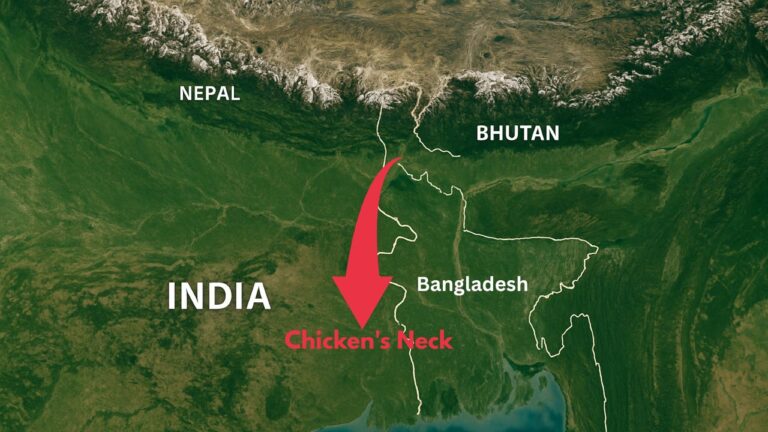
Lucknow, the city of nawabs, tehzeeb, and tantalizing aromas, has officially earned its place on the global culinary map. During the 43rd Session of the UNESCO General Conference held in Samarkand, Uzbekistan, the city was declared a UNESCO ‘Creative City of Gastronomy’, celebrating its centuries-old Awadhi cuisine, inclusive culinary traditions, and living food heritage. This global recognition is not only a tribute to its rich gastronomic culture but also a moment of pride for Uttar Pradesh and India.
A Feast for the World: Why Lucknow Deserves This Honour
Lucknow’s culinary legacy traces back to the royal kitchens of the Nawabs, where food was not merely cooked but crafted, slowly, delicately, and artistically. The Awadhi tradition introduced techniques like ‘Dum Pukht’ (slow cooking) and recipes infused with saffron, dry fruits, aromatic spices, and culinary artistry.
From melt-in-the-mouth Galouti Kebabs, originally prepared for toothless Nawab Asaf-ud-Daula, to the earthy flavours of Nihari-Kulcha, Tokri Chaat, and the fragrant Awadhi Biryani, every dish narrates a story of heritage, hospitality, and harmony. Sweet delights like Makhan Malai, Malai Gilori, and Sheermal have long enchanted food lovers across the world.
It is this cultural and culinary richness, rooted in the Ganga-Jamuni tehzeeb, a harmonious synthesis of Hindu-Muslim traditions, that has now been recognised globally through the UNESCO Creative Cities Network (UCCN).
Leadership Applauds: A Moment of National Pride
Prime Minister Narendra Modi expressed his happiness, calling Lucknow a symbol of India’s vibrant cultural and culinary heritage. In a message shared on X (formerly Twitter), he wrote, “Lucknow is synonymous with a vibrant culture, at the core of which is a great culinary culture. I am glad that UNESCO has recognised this aspect of Lucknow, and I call upon people from around the world to visit and discover its uniqueness.”
Tourism and Culture Minister Jaiveer Singh called the recognition a historic milestone. He said it not only honours Lucknow’s culinary identity but also strengthens Uttar Pradesh’s role in India’s development narrative. “This global recognition shows how tourism is contributing to the vision of a Viksit Uttar Pradesh,” he said.
According to the Uttar Pradesh government, this milestone will boost cultural diplomacy, promote tourism-led development, and inspire food-based entrepreneurship. In 2024, Lucknow witnessed over 8.27 million tourists, while the first half of 2025 recorded 7.02 million visitors, a testament to the city’s rising popularity as a cultural and culinary hub.
Behind the Honour: Nomination and Selection Journey
Earning the UNESCO title involved careful planning, documentation, and collaboration.
• The Directorate of Tourism, Government of Uttar Pradesh, prepared the nomination dossier.
• The proposal was submitted to the Ministry of Culture on January 31, 2025, and officially forwarded to UNESCO on March 3, 2025.
• The dossier highlighted Lucknow’s culinary diversity, its living traditions, innovation in food practices, and community participation.
• Local chefs, artisans, historians, and heritage experts contributed to preserving and showcasing the city’s food culture.
This collaborative effort resulted in Lucknow joining the world’s most celebrated gastronomic cities, a recognition not only of tradition but of sustainability, creativity, and cultural inclusiveness.
What Makes Lucknow’s Cuisine Special?
Lucknow’s cuisine is more than just flavour, it is history served on a plate. Some notable elements include:
• Galouti and Tunday Kebabs: Marinated with over 100 spices, these kebabs are known for their buttery texture and legacy tied to the nawabs.
• Awadhi Biryani: Flavourful and aromatic, cooked over a slow flame with long-grain rice and tender meat.
• Nihari-Kulcha, Puri-Kachori, and Tokri Chaat: Street-side favourites that attract food enthusiasts from around the world.
• Makhan Malai and Malai Gilori: Winter delicacies that reflect refinement and Mughal court influences.
• Ganga-Jamuni Tehzeeb: A culinary philosophy that emphasises plurality, grace, hospitality, and syncretic traditions.
Food in Lucknow is not merely consumed, it is experienced through rituals, etiquette, linguistic elegance, and an ingrained culture of warmth.
Significance of the UNESCO Creative City of Gastronomy Title
The UNESCO City of Gastronomy status is more than a badge of honour, it opens up transformative opportunities:
- Sustainable Cultural Tourism
The recognition will attract global travellers, food historians, bloggers, and chefs, promoting responsible cultural tourism. The state government aims to develop food trails, culinary workshops, heritage walks, and street food festivals to enhance the tourist experience. - Boost to Local Entrepreneurship
From traditional kebab makers to sweet artisans, street vendors, café owners, and culinary startups, everyone stands to benefit. The global spotlight will support small businesses, promote local ingredients, and encourage innovation in traditional recipes. - Heritage Preservation
Traditional cooking methods like Dum Pukht, slow charcoal roasting, and hand-grinding spices will receive renewed attention. Documentation and transmission of age-old recipes to younger generations will be encouraged. - International Collaborations
As a Creative City, Lucknow will collaborate with over 350 cities across more than 100 countries in the UNESCO Creative Cities Network. This will encourage exchanges in gastronomy, culinary research, digital innovation, and sustainable food practices.
Indian Cities in UNESCO Creative Cities Network (UCCN)
With Lucknow’s addition, India now has nine cities in UNESCO’s prestigious network:
Jaipur – Crafts and Folk Art – 2015
Varanasi – Music – 2015
Chennai – Music – 2017
Mumbai – Film – 2019
Hyderabad – Gastronomy – 2019
Srinagar – Crafts and Folk Art – 2021
Gwalior – Music – 2023
Kozhikode – Literature – 2023
Lucknow – Gastronomy – 2025
Lucknow now joins Hyderabad as India’s second city to earn the Gastronomy title, reaffirming the nation’s vast culinary diversity.
A New Era for Lucknow: Road Ahead
The Uttar Pradesh government plans to capitalise on this honour through strategic initiatives:
• Establishing a Culinary Heritage Centre in Lucknow to document recipes, provide chef training, and host cultural exhibitions.
• Launching food festivals and global chef exchange programs.
• Creating digital archives and VR experiences showcasing the Awadhi kitchen.
• Promoting farm-to-table practices and sustainable sourcing of local ingredients.
• Encouraging women-led culinary enterprises and preserving traditional craftsmanship like utensil-making and spice blending.
Conclusion: Lucknow – Where Every Bite Tells a Story
Lucknow’s recognition as a UNESCO Creative City of Gastronomy is not just an honour, it is a celebration of a living culture, a salute to the artisans who knead kebab mince with devotion, guard the slow-cooking dum pukht pots, and treat cuisine as a form of refined art.
This city is not only about kebabs and biryanis, it is about tehzeeb, graceful hospitality, delicate manners, and service from the heart. Lucknow reminds the world that food is not merely to satisfy hunger, it binds relationships, teaches courtesy, and tells stories of love, patience, and craftsmanship.
And now, as the world turns its gaze to Lucknow, the city stands ready, with its fragrant lanes, gentle speech, a plate of warm kebabs, and the timeless grace of “pehle aap” (after you), to welcome every guest into its royal culinary embrace. Here, every bite is a story, every flavour a tradition, and every smile an invitation, offered from the heart and remembered forever.






